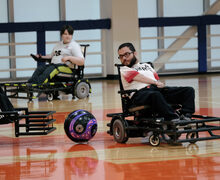Student sues Syracuse University, claiming biased sexual misconduct investigation
Daily Orange File Photo
The lawsuit was filed earlier this week. The plaintiff is demanding a jury trial.
A Syracuse University student placed on indefinite suspension for sexual misconduct filed a lawsuit against the university earlier this week, claiming the investigation into the complaint was biased against him.
The plaintiff, referred to only as “John Doe” in court documents, claims he was wrongfully suspended for a September 2016 act of consensual sex that was considered sexual assault by SU. Doe claims his accuser, referred to as “Jane Roe,” changed and fabricated parts of her account of the sexual encounter during the university investigation that ultimately found Doe guilty of misconduct.
Doe also claims “inadequate procedures” employed by SU, its Board of Trustees, Chancellor Kent Syverud and other university staff members led to an erroneous guilty verdict.
Doe’s lawsuit — the third reported against SU during the 2017-18 academic year with a plaintiff accusing the university of a bias against men when handling a sexual misconduct investigation — comes as colleges nationwide grapple with how to internally investigate and adjudicate sexual misconduct complaints. Some people, including Education Secretary Betsy DeVos, say Obama-era policies guiding colleges’ handling of sexual assault complaints unfairly treat men accused of misconduct.
Sarah Scalese, associate vice president for university communications, said in a statement on Saturday the university takes every alleged incident of sexual violence “extremely seriously.”
“The University’s process to adjudicate sexual assault allegations is fully guided by federal and state law,” she said in the statement. “Per University policy, we do not comment on the specifics of any pending litigation.”
Only Doe’s account of the sexual encounter that led to his suspension is in the March lawsuit.
According to court documents, Roe performed consensual oral sex on Doe — then a second-year student — in the common area of Roe’s dorm suite after they left a party together in September 2016. Roe suggested they continue the sexual encounter in her bedroom and asked her roommates to leave, per the complaint. A student witness to the encounter said it was “pretty clear what they were going to do and [Roe] seemed okay with it,” according to the lawsuit.
The University's process to adjudicate sexual assault allegations is fully guided by federal and state law. Per University policy, we do not comment on the specifics of any pending litigation.Sarah Scalese, associate vice president for university communications
Roe and Doe then engaged in consensual sex, according to the lawsuit. The two exchanged contact information after the encounter, and Roe invited Doe back to her room. Doe did not return to Roe’s room the next day, but met with Roe and her friends a few days later. Doe started hearing rumors that he had done “unspeakable things” to Roe, according to court documents, and he began avoiding her.
In mid-November 2016, Doe received an email from SU that a complaint had been lodged against him, alleging code of conduct violations. That email did not include details of the specific conduct violations, according to court documents.
Doe would later learn in a meeting with Bernie Jacobson, SU’s equal opportunity and Title IX investigator, that Roe said she consented to vaginal intercourse but not oral or anal sex. Roe allegedly claimed in a later interview with Jacobson that she withdrew consent for vaginal intercourse, according to court documents.
Doe claims the oral and vaginal intercourse was consensual, and that anal intercourse never happened, per the lawsuit. Doe, in the lawsuit, claims that the first set of allegations were not documented and relayed to him only verbally. When Roe allegedly changed her story, Doe said in court documents there was “nothing concrete” he could reference to point out the variations in Roe’s account.
Despite what Doe claims are inconsistencies in Roe’s description of the encounter, and contradictory evidence, Jacobson submitted Roe’s account to the University Conduct Board as “wholly plausible,” according to the lawsuit.
Doe also claimed that Jacobson’s investigation was not neutral because of the investigator’s background in protecting the rights of sexual assault victims.
Jacobson, a defendant in the lawsuit, did not respond to a request for comment Saturday afternoon.
The University Conduct Board determined that Roe had consented to oral sex, which contradicted her allegation that she had been forced to perform oral sex. The board was unable to determine that anal sex had occurred, though, according to the lawsuit. The board threw out those parts of Roe’s allegation against Doe, but found him guilty of violating the Code of Student Conduct by continuing vaginal intercourse after Doe withdrew consent.
Doe appealed the board’s decision, according to the lawsuit. He requested a transcript of the University Conduct Board hearing, which did not include Roe’s testimony or questions asked to her by the board, according to the lawsuit.
SU claimed that Roe’s testimony was not recorded because of “technical difficulties,” according to court documents.
Students could appeal sanctions if they believed there was a “procedural error that can be shown to have had a detrimental impact on the outcome of the hearing,” according to the 2016-17 Student Conduct System Handbook. Doe claims in the lawsuit he couldn’t challenge procedural errors that may have occurred during Roe’s testimony because a recording wasn’t made. Doe also claimed the Appeals Board couldn’t determine the credibility of Roe’s testimony because the recording didn’t exist.
After the initial board decision, Doe claims Roe again changed her account of the September 2016 encounter by stating in response to Doe’s appeal that she had been “too drunk to consent to anything.” That statement was at odds with the initial investigation and conduct board’s findings, according to court documents.
The Appeals Board did not consider the technical malfunction a procedural error, according to the lawsuit, and the university rejected Doe’s appeal.
Doe is demanding a jury trial, according to court documents. Andrew Miltenberg, one of three lawyers representing Doe, was described by Newsweek as a go-to lawyer for male respondents in sexual assault cases.
SU lawsuit by michaelburke47 on Scribd
Published on March 31, 2018 at 8:23 pm
Contact Jordan: [email protected] | @jordanmuller18




